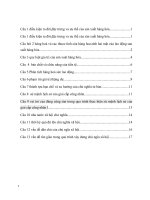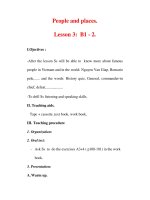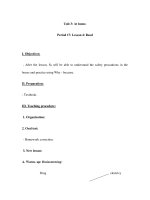Đề cương Ang Văn Cơ Bản 4 bài 13
Bạn đang xem bản rút gọn của tài liệu. Xem và tải ngay bản đầy đủ của tài liệu tại đây (460.88 KB, 10 trang )
-
GENERAL ENGLISH 4
Unit 4: Adventure
ADVENTURE
UNIT 4
4d. A happy ending
4e. A story of survival
4f. Alaskan ice climbing
Review
OBJECTIVES
After this part, students will be able to:
• Know how to tell a story by using some linking words.
• Practise writing skill on the topic “A story of survival” using –ly adverbs.
• Improve listening skill by watching video.
OVERVIEW - NỘI DUNG
SECTION 1: PREPARATION
1
2
GRAMMAR - NGỮ PHÁP
VOCABULARY – TỪ VỰNG
Past Simple &
Word choice
Past Continuous Tense
1. GRAMMAR
1 .1
Choose the correct option (a or b) to complete the sentences.
1. We were driving home when the accident ..................
A. was happening
B. happened
2. What .............. when the fire started?
A. you were doing
B. were you doing
3. He took out a knife and quickly .....................the rope.
A. cut
B. was cutting
4. .............the right equipment with you on your camping trip?
A. Had you
Page 1
B. Did you have
UNETI
GENERAL ENGLISH 4
-
UNETI
Unit 4: Adventure
5. We slipped while we ..............over the edge of the cliff.
A. were climbing
B. climbed
6. They didn’t ..............any stupid risks during their expedition.
A. take
2.
B. took
VOCABULARY
2 .1
Complete the exchanges with these words.
ambition
challenge
determined
intelligent
patient
risks
1. A: Jane has got such an amazing mind.
B: Yes, she’s the most intelligent person I’ve ever met.
2. A: She shouldn’t get so angry with people.
B: I know.She should learn to be more patient
3. A: John wasn’t very good at history.
B: I know. Passing his history exam was the biggest challenge he ever faced.
4. A: Mountain climbing can be very dangerous.
B: That’s right. Most climbers are people who love to take risks
5. A: Why did they go on a road trip round the world?
B: Well, it was always their ambition to travel the world.
6. A: No matter how dangerous, he always achieves his goal. B:
Yes, he’s so determined that nothing can stop him.
2 .2
Choose the correct option to complete the sentences
1. My biggest ...............at school was passing my mathematics exam. I got an A grade
in the end.
A. achievement
B. challenge
C. decision
2. Don’t get angry when things don’t happen as fast as you’d like. Learn to be ...............
A. patient
B. reliable
C. experienced
3. Probably the most ..............person in history was Albert Einstein. He had an amazing
brain.
A. ambitious
B. careful
C. intelligent
4. You dropped water everywhere. Please try to be more ...............!
A. ambitious
Page 2
B. careful
C. determined
GENERAL ENGLISH 4
-
UNETI
Unit 4: Adventure
SECTION 2: ONLINE MEETING
1
2
WARM – UP
Check students’
3
LISTENING
PRONUNCIATION
A happy ending
Intonation for responding
homework
4
5
WRITING
WATCHING VIDEO
A story of survival
Alaskan ice climbing
OVERVIEW - NỘI DUNG
CHECK STUDENTS’ HOMEWORK
1
Exercise 1: Work in pairs. Tell your partner which of these events happened to you in
the past.
Students’ own answers.
Exercise 2: Choose the correct form of the verb.
1. were you doing
2. Were you having
3. invited
4. was trying
5. didn’t know
6. were waiting
7. was speaking
8. finished
9. was just looking
4d. A HAPPY ENDING – LISTENING: Real life telling a story
2
1.1.26. Listen to a conversation between two friends about a camping trip. Answer the
questions.
1. Was the start of the weekend good or bad?
2. When did Mark and the others leave?
3. Where did the car break down? Who fixed it?
4. Why couldn’t they find the campsite at first?
Page 3
GENERAL ENGLISH 4
-
Unit 4: Adventure
UNETI
5. What happened after they found the campsite?
6. Where did they go instead?
2.
1.26. Listen again and complete the conversation.
A: Hi Mark. How was your camping trip?
B: It was great in the end but we had a terrible time at the beginning.
A: Why?
B: (1) …………, we left the house early on Saturday morning but after only half an hour the
car broke down.
A: Oh no!
B: (2) …………, there was a garage nearby and the mechanic fixed the problem. But (3)
………… we arrived at the forest, it was getting dark. (4) ………… we drove around for
about an hour, we (5) ………… found the campsite but it was completely dark by then. (6)
…………, it started raining so we found a nice hotel down the road!
A: That was lucky!
B: Yes, it was a great hotel and (7) ………… ………… ………… we stayed there for the
whole weekend.
A: (8) ………… …………!
3.Match the words and expressions (1-8) in Exercise 2 with the correct section in the
box.
TELLING A STORY
Sequencing the story
At the beginning …………
Then …………
Next…………
While …………
Introducing good and bad news
Luckily …………
But …………
Reacting to good and bad news
Why? That was a good idea! Oh no!
3
4d. A HAPPY ENDING - PRONUNCIATION
1.1.27. Listen to the expressions in ‘Reacting to good and bad news’ in the box. Notice
how the listener uses intonation to show interest. Then listen again and repeat.
2.
Work in pairs. Read the conversation in Exercise 2 aloud. Take turns to be person
A. Pay attention to your intonation when you are responding.
3.3. Practise telling another story with your partner.
Page 4
-
GENERAL ENGLISH 4
UNETI
Unit 4: Adventure
Student A cycled to work and these events happened.
• You had a terrible journey to work.
• You were cycling and it started raining.
• A car hit your bicycle.
• You weren’t hurt.
• The driver was very nice. He owns a bicycle shop.
• He gave you a new bike! It’s much better than your old bicycle!
Tell your story to Student B. Student B listens and responds. Then change roles and repeat
the story.
3.4. Think of a bad journey you had. Did it have a happy ending? Make a list of the
events. Then tell your partner the story.
4
1.
4e. A STORY OF SURVIVAL - WRITING
Writing a true story
1.When you read the news, is it always bad news? Are there ever any news stories
with good news or happy endings?
2.True stories in the news often include some or all of this information. Read the
story and find out which of this information is included.
the location
the weather
why they were there
the people
any sudden or unexpected
events that changed the situation
how the situation endeda
happy or sad ending
BOYS SURVIVE 50 DAYS LOST AT SEA
It’s amazing story and it’s true!
Fifty days ago, three teenage boys suddenly disappeared from the island of Atafu in a small
boat. Immediately, rescue boats went to look for them but sadly there was no sign of their
boat. Eventually, a fishing boat in the middle of the Pacific Ocean safety pulled them from
the sea. The boys were badly sunburned and dehydrated but doctors said they were in
surprisingly good health. Now, they are back happily with their families.
2. Writing skill using –ly adverbs in stories
1.Look at the sentence from the story in Exercise 2. We often use –ly adverbs to
make a story more interesting. Underline the other –ly adverbs in the story.
Fifty days ago, three teenage boys suddenly disappeared from the island of Atafu in a small
boat.
Page 5
GENERAL ENGLISH 4
-
Unit 4: Adventure
UNETI
4.2.2. Match the adverbs you underlined in Exercise 3 with the rules (1-3).
-LY ADVERBS
We often use –ly adverbs to:
1. comment on the whole clause or sentence.
Eventually, they saw another ship in the distance.
2.describe the verb (how someone did something or how it
happened).
He slowly swam towards the island. (Also he swam towards
the island slowly.)
3. describe an adjective.
The three survivors were amazingly health.
Many adverbs are adjectives + -ly, e.g.sudden - suddenly
3.
Make these sentences from stories more interesting using the adverbs.
1. The climb was dangerous. (incredibly)
→ The climb was incredibly dangerous.
2. The sun was shining. (brightly)
→ The sun was brightly shining
3. The man jumped into the car. ( quickly)
→ The man quickly jumped into the car.
4. They were nearly at the top of the mountain but one of them slipped. (suddenly)
→They were nearly at the top of the mountain but suddenly one of them slipped
5. It started raining. Gill had an umbrella. (fortunately)
→ It started raining. Unfortunately, Gill had an umbrella
6. The amazon river was long and they were lost for days. (amazingly)
→ The amazon river was amazingly long and they were lost for days
7. They walked back and looked into each other’s eyes. (slowly)
→ They walked back and looked into each other’s eyes slowly
8. They were lost in the forest for hours but they found the road again. (eventually)
→ They were lost in the forest for hours but eventually they found the road again
Page 6
GENERAL ENGLISH 4
-
Unit 4: Adventure
UNETI
4.2.4. You are going to write a true story. It can be from your own life or a story
you
read in the newspaper. Think about these questions and make notes.
• Where did it happen?
• What was the weather like?
• Who was there and what were they doing?
• What unexpected event happened?
• What happened next?
• Did it have a happy or sad ending?
4.2.5. Write your story. Use –ly adverbs to make it more interesting.
Page 7
GENERAL ENGLISH 4
-
Unit 4: Adventure
UNETI
4f. WATCHING VIDEO – Alaskan ice climbing
5
1. Before you watch
1.
Work in pairs. Look at the photo and discuss the questions.
1. Where is the woman?
2. What is she doing?
3. Do you think this is a dangerous activity?
4. How do you think she is feeling?
5.1.2. What do you think these words mean? Try to match the words (1-3) with the
correct meaning (a-c).
1. Serac
a. a narrow, deep hole in ice
2. Crevasse
b. an area with many seracs
3. Ice fall
c. large piece of glacial ice that sticks up in the air
5.2. While you watch
Watch the video again and put the events from the climbers’ trip in order (1-8)
1.
a. It was a very special feeling for the woman when she got to the top.
b. They drove to the Matanuska glacier.
c. They hiked across the glacier.
d. When they arrived at Talkeetna, the weather was so bad that they couldn’t fly to
Mount McKinley.
e. A woman slipped, but the rope saved her.
f. After a long walk they reached solid ice at the heat of the glacier.
g. When they arrived at the glacier, the guides explained how to use the equipment
h. They started climbing the ice wall.
Page 8
GENERAL ENGLISH 4
-
Unit 4: Adventure
UNETI
5.2.2. Watch the video again and make notes about these topics.
The weather on the trip
The glacier
The guides
The equipment
The dangers
3.
After you watch
1.
Roleplay telling a friend about a trip.
Work in pairs.
Student A: You are one of the people who went to the glacier. You are now back at home.
Tell a friend about your trip. Use the ideas below to make notes.
Student B: Your friend went on a trip to a glacier in Alaska. Use the ideas below to prepare
questions to ask your friend.
• the journey to the glacier
• what the glacier was like
• what the weather was like
• the equipment
• what the climb was like
• how it felt to get to the top
Act out the conversation. Then change roles and have another conversation about a different
trip.
2.The narrator says Colby and Caitlin are not usually doubtful when they’re in the
mountains. What does this tell you about them?
3.
Work in pairs. Discuss these questions.
1. What kind of people like ice climbing?
2. Would you like to go ice climbing? Why? / why not?
6. CONSOLIDATION
After the lesson, you have
• known how to tell a story by using some linking words.
• known how to use intonation for responding.
• practised writing skill on the topic “A story of survival” using –ly adverbs.
• improved listening skill by watching video.
Page 9
GENERAL ENGLISH 4
-
Unit 4: Adventure
UNETI
7. ASSIGNMENTS
WORKBOOK ONLINE:
-
Complete all the exercises of online workbook unit 4!
HOMEWORK:
-
Grammar: Revise the forms and uses of past simple and past continuous.
-
Vocabulary: Revise some vocabulary about the topic: “Personal qualities &
Geographic features”.
P/S: The e-lectures are in the process of development. We hope to have a better series for
our dear students. All feedback is welcome and appreciated. E-mail:
Thank you!
Page
10









